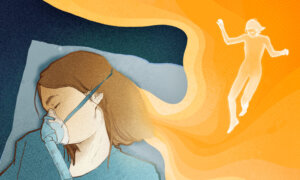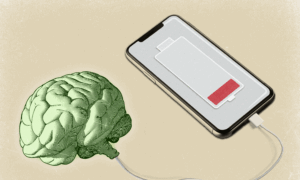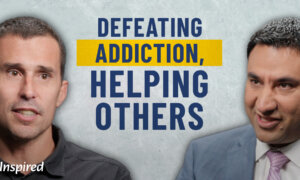“Awe is the feeling of being in the presence of something vast that transcends your current understanding of the world,” writes Dacher Keltner in his book “Awe: The New Science of Everyday Wonder and How It Can Transform Your Life.”
This feeling is usually associated with observing sublimeness in nature: grand mountains, trees, vast dunes, or the wide ocean horizon.
However, nature is not the only source of awe, nor the most common. Moreover, awe extends far beyond a momentary feeling of wonder or inspiration, influencing our health in at least five ways.
A Surprising Source of Awe
People can be awestruck by philosophical insights, scientific discoveries, music, visual design, spirituality and religion, personal realizations, impressive feats, and epiphanies. Even simply learning about other interesting people stimulates awe. Research suggests that when participants watch videos of inspiring people like Mother Teresa, this can, in turn, trigger awe.To determine the most common source of awe, Keltner conducted an experiment asking participants worldwide to write stories that caused them to feel awe.
Out of the 2,600 stories collected, the most common source of awe worldwide is moral beauty: exceptional virtue and character marked by purity and goodness of intention and action. This includes witnessing other people’s courage, kindness, strength, or overcoming hardship—for instance, stories of individuals risking their lives to save strangers or acts of kindness during disasters.
Moral beauty also includes how people feel awestruck by the beginning—or end—of life. Many mothers note that giving birth is the most significant source of awe. Keltner documents in his book about a mother from Japan: “[I] was deeply moved by the realization and responsibility of becoming a parent, as well as the preciousness of life. From now on I felt that I would desperately live just to protect this life.”
A mother from Russia expressed that she just “wanted to hug the entire world” after childbirth. Fathers also feel awe. A man from Indonesia wrote, “I just couldn’t believe what a beautiful and wonderful gift God has bestowed on my wife, and I just couldn’t stop smiling and feeling awe and grateful to God for giving us a son.”
According to Keltner, money and possessions did not contribute to awe. In the study, which is currently under peer review, no one mentioned their laptop, Facebook, or smartphone. Nor did anyone mention their new Nikes, Tesla, or Gucci bag. Keltner writes: “Awe occurs in a realm separate from the mundane world of materialism, money, acquisition, and status signaling—a realm beyond the profane that many call the sacred.”
A Language Everyone Speaks
A paper published in Nature found that across 12 diverse world regions, awe stimulates a unique facial response similar to universal expressions such as amusement, contentment, and pain.
(Shutterstock)
Cross-culturally, when awe washes over someone, such as when viewing fireworks or shooting stars, their face transforms, reacting with the same facial expression—eyebrows arch high, eyes widen as if trying to absorb every detail of the magnificent sight. Their jaw slackens, mouth slightly agape, frozen in a moment of speechless wonder. A gentle smile plays at the corners of their lips, and their head tilts back slightly as if pulled by an invisible thread.
A study tested the vocal bursts for 16 emotions, including awe, anger, fear, and sadness, across 10 cultures and even a remote village in Bhutan. Sounds of awe like “whoa” and “wow” were recognized with about 90 percent accuracy, making awe one of the most universally recognized emotions.
How Awe Affects Health
Awe stimulates well-being in five ways. The first is through a shift in the immune system.Cytokines are chemical messengers that signal the immune system to work harder. They are important for a pro-inflammatory response to kill pathogens and heal wounds. Yet a hyperactive cytokine response is associated with poor health and disorders such as arthritis, Alzheimer’s, and clinical depression. Most notably, in recent years, the word “cytokine storm” in COVID-19 has been synonymous with severe disease and poor outcomes.
Emerging research is starting to acknowledge the role of positive emotions in our physical health. A 2015 study in the journal Emotion demonstrated that several positive emotions, such as joy and love, lowered levels of the cytokine interleukin-6 (IL-6), an indicator of inflammation levels.
However, the greatest predictor of reduced cytokine levels, up to three times more than joy, was the feeling of awe.

Illustration by The Epoch Times
A 22-day longitudinal study published in Scientific Reports observed adults and health care professionals during the COVID-19 pandemic and found that the more daily awe people experienced, the less stress they experienced, and the fewer somatic health symptoms they had (e.g., headaches and trouble sleeping).
These studies suggest that awe can benefit individuals with inflammation and during periods of acute and chronic stress, such as the COVID-19 pandemic.
Awe can also affect health through increased social integration, prosociality, a heightened sense of meaning, and a diminished sense of self.
Smaller ‘Me’
Professor Yang Bai of the University of California–Berkeley and her team conducted a study in Yosemite National Park. Over a few days, they approached more than 1,100 travelers from 42 countries. While looking at the expansive view of the Yosemite Valley, participants were asked to draw themselves on paper and write “me” next to their drawing.In the control condition, participants were asked to do the same at Fisherman’s Wharf in San Francisco, a popular tourist destination.

Illustration by The Epoch Times
Those in Yosemite drew themselves up to 33 percent smaller, and the “me” was also smaller. According to the researchers, the size of the drawn self and how large one writes “me” are pretty good indicators of how self-focused the individual is.
This change in self-perception leads to significant social outcomes. In one experiment, participants who spent a minute looking at tall trees were likelier to help someone who dropped pens than a control group who spent a minute looking at a modern science building.

Illustration by The Epoch Times
Those who experienced awe also took less money for participating in the study and reported feeling less entitled and narcissistic, suggesting that awe can increase prosocial behavior, reduce egocentrism, and reduce focus on personal gain.
Anousheh Ansari, a space tourist, shared her feelings about experiencing immense awe in outer space: “The actual experience exceeds all expectations and is something that’s hard to put to words … It sort of reduces things to a size that you think everything is manageable … All these things that may seem big and impossible … We can do this. Peace on Earth — No problem. It gives people that type of energy … that type of power, and I have experienced that.”
Perhaps, then, it’s not surprising that awe primes us to be more spiritual. In a 2013 study, researchers found that participants who had seen something awe-inspiring scored spiritually higher than those who had not.
The researchers concluded that awe-inspiring experiences increase our motivation to make sense of the world, which may trigger belief in the supernatural.
This spiritual stimulation further increases mental and physical health.

Illustration by The Epoch Times
“Our bodies respond to healthy doses of awe-inspiring nature like we respond to a delicious and nutritious meal, a good sleep, a quenching drink of water, or an uplifting gathering with friends or family: we feel nourished, strengthened, empowered, and alive,” writes Keltner. It also reduces the likelihood of cardiovascular disease, autoimmune disease, diabetes, depression, post-traumatic stress disorder (PTSD), and anxiety, as well as everyday aches and pains.
“Everyday awe is a basic human need,” Keltner notes. We can reclaim this sense of awe by approaching life inquisitively—seeking the often-missed marvels of nature and the touching displays of human kindness that surround us.













